from May. 16, 1865
Department of Foreign Relations and Government - Mexican Response to Lincoln Assassination
-
Full Title
Department of Foreign Relations and Government - Mexican Response to Lincoln Assassination
-
Description
In this official letter from the exiled Mexican government, Sebastián Lerdo de Tejada, the minister of foreign affairs, notifies the United States of their remorse for the death of President Abraham Lincoln. The letter says the Mexican government will fly flags at half mast and wear mourning attire for nine days to honor Abraham Lincoln. Lerdo de Tejada served as second in command to exiled Mexican President Benito Juarez during the "French Intervention" which began in 1861. The French, backed by conservatives and nobility in Mexico, tried to overthrow Mexican President Benito Juarez. Juarez set up his government in exile in northern Mexico, in Chihuahua City, and eventually won the war in 1867.
-
Transcription
Hon. William H. Seward, &c.
_____
[Enclosure No. 1. – Translation.]
[Official.]
DEPARTMENT OF FOREIGN RELATIONS AND GOVERNMENT—DEPARTMENT OF GOVERNMENT, FIRST BUREAU.
[Circular.]
The official confirmation has been received that the President of the United States of America, Abraham Lincoln, died at Washington, at seven o’clock and twenty-two minutes, on the morning of the 15th day of April last, in consequence of the wound inflicted upon him by an assassin at half past nine o’clock on the previous night. The deplorable end of President Lincoln is a cause of great regret to the government of the Mexican republic, and to all its good citizens, by reason of his eminent personal qualities and because, during his administration, the government of the United States has continued in the most friendly relations with that of the Mexican republic in the difficult state of affairs thereof.
With the view that the manifestations of the public sorrow for that end event may be adopted, the citizen President directs that the national flag be hoisted at half-mast upon all the public buildings and at all the military stations during the day subsequent to the reception of this circular, and that all the authorities, functionaries, and employés, both civil and military, clothe themselves in mourning during nine days.
Independence and liberty! Chihuahua, May 16, 1865.
LERDO DE TEJADA
The Citizen Governor of the State of ——— .
[Transcription by: Ricarda H., Dr. Susan Corbesero’s Class, Ellis School, Pittsburgh, Pennsylvania] -
Source
Google Books
-
Rights
This item is in the public domain and may be reproduced and used for any purpose, including research, teaching, private study, publication, broadcast or commercial use, with proper citation and attribution.
-
Tags
-
Cite this Item
Sebastián Lerdo de Tejada. "Department of Foreign Relations and Government - Mexican Response to Lincoln Assassination". Government Printing Office. Remembering Lincoln. Web. Accessed August 22, 2025. https://rememberinglincoln.fords.org/node/1124
-
Creator
Sebastián Lerdo de Tejada
-
Publisher
Government Printing Office
-
Date
May 16, 1865
from May. 16, 1865
Department of Foreign Relations and Government - Mexican Response to Lincoln Assassination
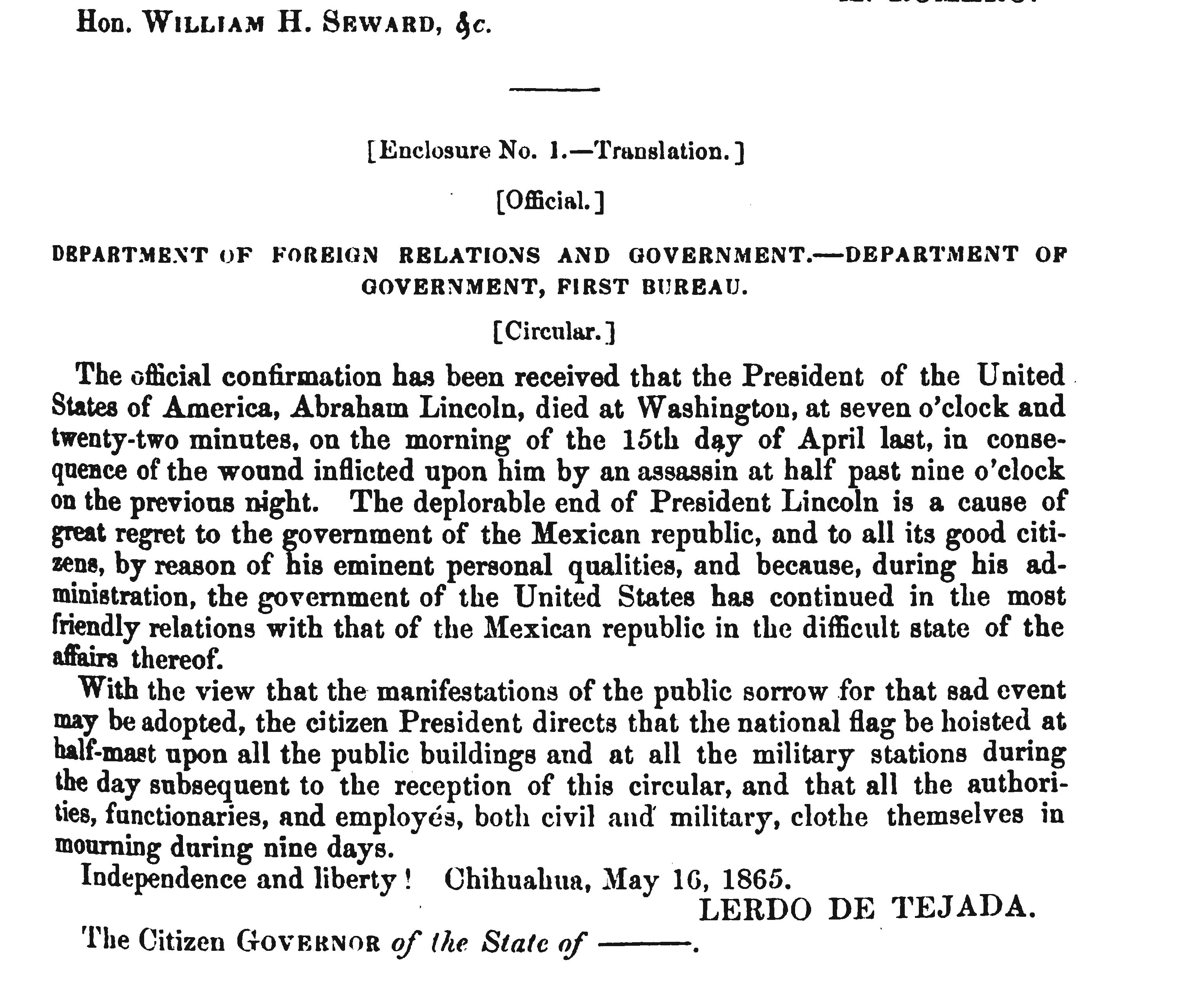
-
Description
In this official letter from the exiled Mexican government, Sebastián Lerdo de Tejada, the minister of foreign affairs, notifies the United States of their remorse for the death of President Abraham Lincoln. The letter says the Mexican government will fly flags at half mast and wear mourning attire for nine days to honor Abraham Lincoln. Lerdo de Tejada served as second in command to exiled Mexican President Benito Juarez during the "French Intervention" which began in 1861. The French, backed by conservatives and nobility in Mexico, tried to overthrow Mexican President Benito Juarez. Juarez set up his government in exile in northern Mexico, in Chihuahua City, and eventually won the war in 1867.
-
Source
Google Books
-
Rights
This item is in the public domain and may be reproduced and used for any purpose, including research, teaching, private study, publication, broadcast or commercial use, with proper citation and attribution.
-
Creator
Sebastián Lerdo de Tejada
-
Publisher
Government Printing Office
-
Date
May 16, 1865
from May. 11, 1865
Mexican President Benito Juarez Response to the Lincoln Assassination
-
Full Title
Mexican President Benito Juarez Response to the Lincoln Assassination
-
Description
This is a condolence letter from the exiled Mexican President Benito Juarez. In the letter Juarez mourns the loss of Abraham Lincoln and also hopes that the U.S. Secretary of State and his son recover from their wounds. On the night of President's assassination, U.S. Secretary of State William Seward was also attacked. He was stabbed repeatedly in his home by conspirator Lewis Powell. Eventually Seward recovered from his wounds. Benito Juarez served as President in Mexico until 1863, when French forces invaded Mexico during the "French Intervention" which began in 1861. The French, backed by conservatives and nobility in Mexico, tried to overthrow Mexican President Benito Juarez. Allies of Juarez fled to New York City, considered a safe haven by Mexican liberals. Juarez set up his government in exile in northern Mexico, in Chihuahua City.
-
Transcription
Hon. William H. Seward, &c.
_____
[Enclosure No. 1. – Translation.]
Chihuahua, May 11, 1865.
My Dear Friend …
We also received the day before yesterday the news of the total defeat of the confederate army on the 9th of April. The great pleasure this news afforded us was marred by the very sad impression which the shocking intelligence of President Lincoln’s assassination produced upon us. That great misfortune has profoundly impressed me, as Mr. Lincoln, who worked with so much earnestness and abnegation for the cause of nationality and freedom was worthy of a better fate than the poniard of a coward assassin. I do most earnestly hope that Mr. Seward’s wounds would not be mortal, and that his son too, may have been saved. I beg of you to pay a private visit to Mr. Seward in my name, expressing to him my grief for the misfortunes befallen upon him, and my best wishes for his speedy and complete recovery.
Benito Juarez
Senor Don Matias Rombro
[Transcription by: Ricarda H., Dr. Susan Corbesero’s Class, Ellis School, Pittsburgh, Pennsylvania]
-
Source
Google Books
-
Rights
This item is in the public domain and may be reproduced and used for any purpose, including research, teaching, private study, publication, broadcast or commercial use, with proper citation and attribution.
-
Tags
-
Cite this Item
Benito Juarez. "Mexican President Benito Juarez Response to the Lincoln Assassination". Government Printing Office. Remembering Lincoln. Web. Accessed August 22, 2025. https://rememberinglincoln.fords.org/node/1123
-
Creator
Benito Juarez
-
Publisher
Government Printing Office
-
Date
May 11, 1865
from May. 11, 1865
Mexican President Benito Juarez Response to the Lincoln Assassination
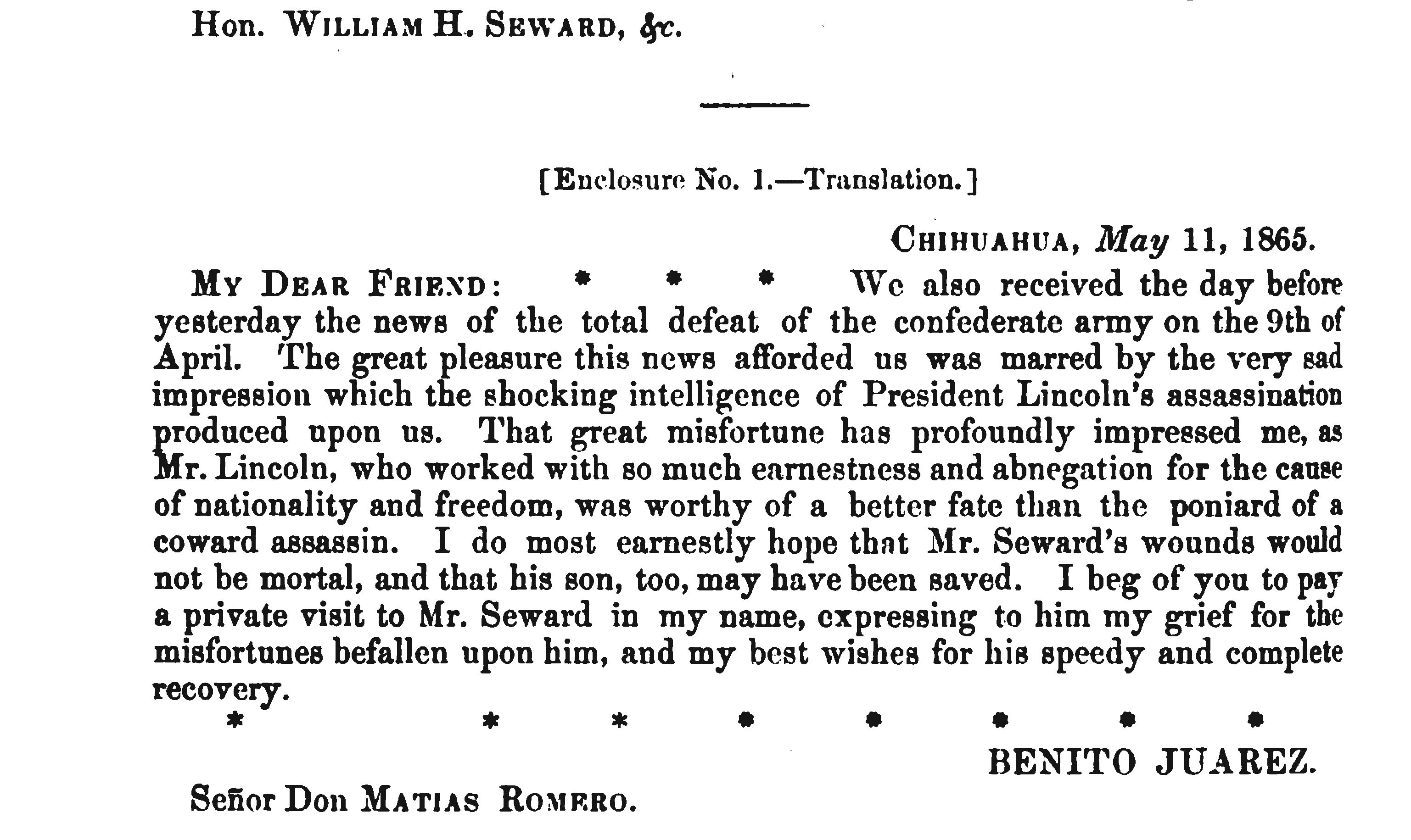
-
Description
This is a condolence letter from the exiled Mexican President Benito Juarez. In the letter Juarez mourns the loss of Abraham Lincoln and also hopes that the U.S. Secretary of State and his son recover from their wounds. On the night of President's assassination, U.S. Secretary of State William Seward was also attacked. He was stabbed repeatedly in his home by conspirator Lewis Powell. Eventually Seward recovered from his wounds. Benito Juarez served as President in Mexico until 1863, when French forces invaded Mexico during the "French Intervention" which began in 1861. The French, backed by conservatives and nobility in Mexico, tried to overthrow Mexican President Benito Juarez. Allies of Juarez fled to New York City, considered a safe haven by Mexican liberals. Juarez set up his government in exile in northern Mexico, in Chihuahua City.
-
Source
Google Books
-
Rights
This item is in the public domain and may be reproduced and used for any purpose, including research, teaching, private study, publication, broadcast or commercial use, with proper citation and attribution.
-
Creator
Benito Juarez
-
Publisher
Government Printing Office
-
Date
May 11, 1865
from Apr. 15, 1865
Condolences from the Mexican Club of New York
-
Full Title
Condolences from the Mexican Club of New York to Secretary of State William Seward
-
Description
This is a condolence letter from the Vice President of the Mexican Club of New York to the U.S. Secretary of State William Seward after news of Abraham Lincoln's assassination reached New York. The letter talks about how important President Lincoln was to the ideals of liberty and freedom in the United States and reaffirms Mexico's commitment to their friendship with the country. The Mexican Club of New York was created in 1864, as exiles from the Mexican government fled Mexico during the French Intervention, which began in 1861. The French, backed by conservatives and nobility in Mexico tried to overthrow Mexican President Benito Juarez. Allies of Juarez fled to New York City, considered a safe haven by Mexican liberals. U.S. Secretary of State William Seward quietly supported the work of the Club but refused to promise too more nor interfere with the war in Mexico. The Club's president, Benito Quijano, had died in early 1865 and at the time of Abraham Lincoln's death a new successor had not been chosen.
-
Transcription
Republic of Mexico
[Enclosure No. 2 – Translation.]
Mexican Club at New York.
New York, April 15, 1865.
Sir: The Mexican Club of New York, profoundly affected by the tragic and premature death of the President of the United States, Abraham Lincoln, has resolved to manifest to your excellency that the citizens which compose it fully sympathize the affliction of the American people; that they look upon the loss of this eminent patriot not only as a great calamity to the United States, but as a just cause of mourning for all the peoples who in America enjoy liberty, or are contending to restore it; and they believe that with Lincoln there has disappeared from earth one of the great benefactors of humanity, who, on descending to the tomb, has been crowned with the laurel of immortality and martyrdom.
To the veneration which Lincoln will have in history, as the personification of the great American people, in his firmness, in his energy, in his enlightenment, and in his magnanimity, to his great title of the emancipator of the slaves, he will always add in the hearts of the Mexicans the acknowledgement which the love of justice and the respect for law inspires, of which he gave proofs, in not sanctioning the outrages committed against Mexico, and in not acknowledging in that republic any other power than that which is derived from the institutions and the free national will.
The Mexican Club, in taking part in the affliction of the people of the United States, upon whom it looks as a nation of brothers, cherishes the hope that as the spirit of Washington has animated this nation in the work of consolidating its institutions, so the spirit of Lincoln may continue to guide it until peace and union are restored, slavery abolished, and until it shall become the bulwark of liberty for all America.
On addressing this manifestation to your excellency, we have the honor to offer to you the assurances of our very distinguished consideration.
In absence of the president, from indisposition,
IGNACIO MEJIA, Vice President.
CIPRIANO ROBERT, Secretary.
Hon. Secretary of State of the United States.
[Transcription by: Ricarda H., Dr. Susan Corbesero’s Class, Ellis School, Pittsburgh, Pennsylvania] -
Source
Google Books
-
Rights
This item is in the public domain and may be reproduced and used for any purpose, including research, teaching, private study, publication, broadcast or commercial use, with proper citation and attribution.
-
Tags
-
Cite this Item
Ignacio Mejia. "Condolences from the Mexican Club of New York to Secretary of State William Seward". Government Printing Office. Remembering Lincoln. Web. Accessed August 22, 2025. https://rememberinglincoln.fords.org/node/1122
-
Creator
Ignacio Mejia
-
Publisher
Government Printing Office
-
Date
April 15, 1865
from Apr. 15, 1865
Condolences from the Mexican Club of New York to Secretary of State William Seward
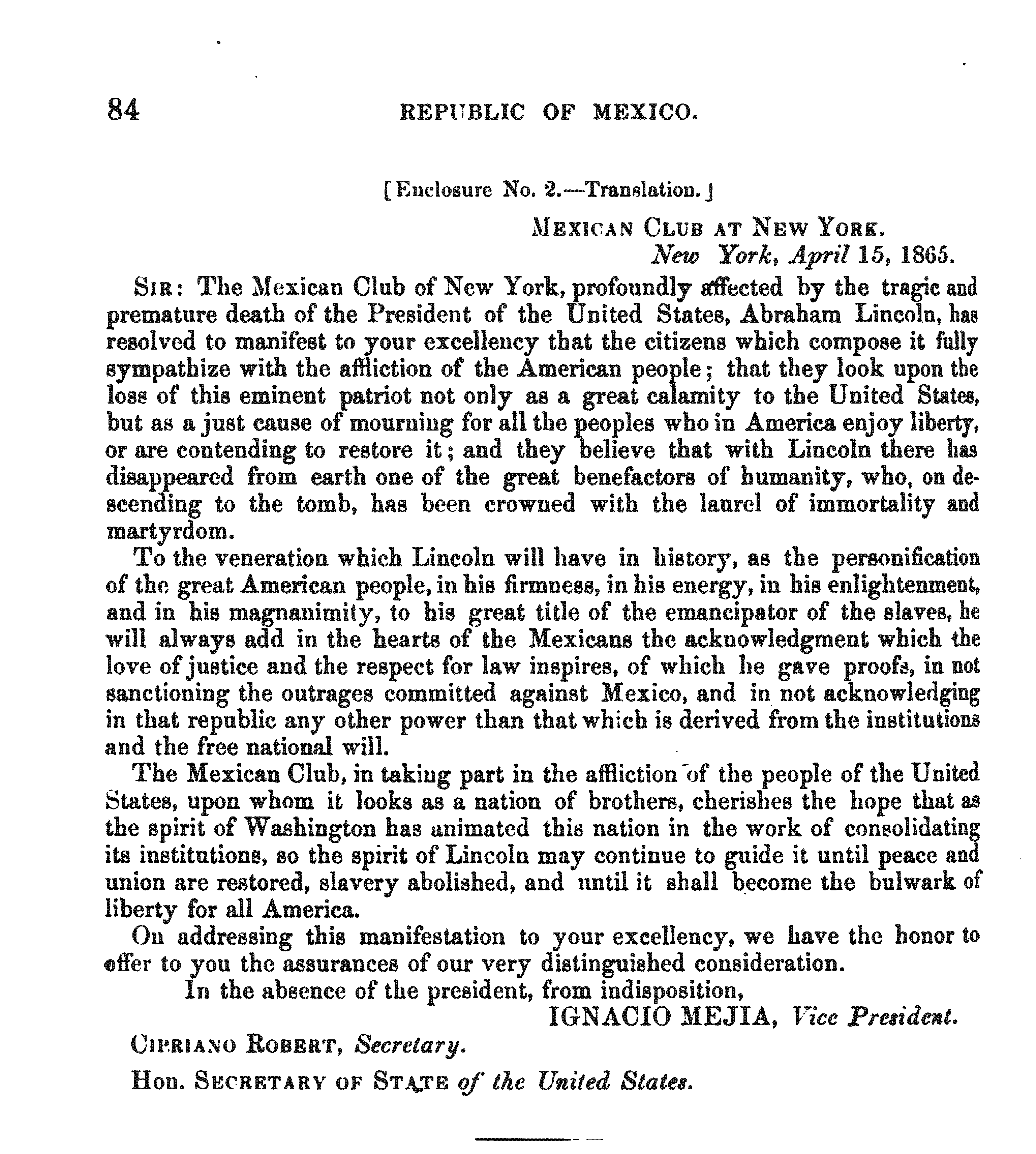
-
Description
This is a condolence letter from the Vice President of the Mexican Club of New York to the U.S. Secretary of State William Seward after news of Abraham Lincoln's assassination reached New York. The letter talks about how important President Lincoln was to the ideals of liberty and freedom in the United States and reaffirms Mexico's commitment to their friendship with the country. The Mexican Club of New York was created in 1864, as exiles from the Mexican government fled Mexico during the French Intervention, which began in 1861. The French, backed by conservatives and nobility in Mexico tried to overthrow Mexican President Benito Juarez. Allies of Juarez fled to New York City, considered a safe haven by Mexican liberals. U.S. Secretary of State William Seward quietly supported the work of the Club but refused to promise too more nor interfere with the war in Mexico. The Club's president, Benito Quijano, had died in early 1865 and at the time of Abraham Lincoln's death a new successor had not been chosen.
-
Source
Google Books
-
Rights
This item is in the public domain and may be reproduced and used for any purpose, including research, teaching, private study, publication, broadcast or commercial use, with proper citation and attribution.
-
Creator
Ignacio Mejia
-
Publisher
Government Printing Office
-
Date
April 15, 1865
from Apr. 29, 1865
Letter from L.D. Bradley to Minnie Bradley
-
Full Title
Letter from L.D. Bradley to Minnie Bradley
-
Description
Letter from L. D. Bradley to Minnie Bradley, dated April 29, 1865 and sent from Galveston, in which he writes about his concern for her health, mentions the death of President Lincoln and his presumptions about its effect on the war.
-
Transcription
Galveston, April 29th 1865,
Jimmy McIlveen,
Taz Watson
Jim Blackmon
Little Honey(?),
Since writing to you I have received your letters of the 9th, 13th & 16th of April; the two first arrived two or three days since, the last, this evening. I have been very uneasy about the baby; your letter received this evening, however, somewhat, though not entirely, reassures me. I am becoming a good deal uneasy about you also Little Darling; in your other letters you mention that you have had for some time a very troublesome cough; in the last one, you say you have quite a severe pain in the shoulder and breast. Little Honey, my own darling little wife, you must take more, and better, care of yourself. I knew perfectly well your disposition to worry, and do all the work about the children yourself; to get up in the night to wait upon them &c; now that must be stopped. You ought to recollect, Little Honey, that with me it is exactly as if I had no one in the world to love, or be loved by, but yourself. It is very true that I love the children, but, Little Darling, when I think of you in comparison with any one, or all, others, it seems to me that you are my “all in all”. I have commenced writing back(?) this evening, on account of having just received your letter, & having some leisure time, but do not expect to finish until to-morrow; Jimmy McIlveen & Taz Watson start up on Monday, that is day after to-morrow, and I will send this letter by one of them. By the way, Little Honey, two or three of the company have come from home recently, all of whom say that they saw your father in town about the time they were starting, & still no letter from you by any of them. I know perfectly well that it is not your fault, but then I would like to know the reason for it. There is no late news of interest except what you have probably learned through the papers. Lincoln & Seward being killed seems to be regarded as a kind of offset to the surrender of Lee & his army. The number surrendered by Lee has settled down to something less than 12,000, and they seem to have been mostly detailed men, reserves &c; if such is the case they are but very little loss. The loss in machinery, stores &c, however, was very large; for the Confederates, it was immense; and one which will not be easily recovered from. I have not a particle more of doubt as to the result of this war now, then I had three years ago, or at its commencement; I think however it is fast tending towards a guerrilla arrangement, In some respects that would suit me very well; there would then be no dodgers or shirkers; every body would have to be on one side or the other; and, best of all, I think it would take but a very short time for guerrillas to make a clean riddance of Speculators, extortioners, and all the other species of the [illegible] kind, who have been infesting the confederacy. On the other hand, it would be terrible on women & children, and in that I am particularly interested. There is one thing however very certain; if events do turn out in that way; wherever I may go, & in whatever I may engage, I shall always keep you very near to me. But I will not endeav-er not to anticipate any thing further, of a gloomy character; it is bad enough any how; without the trouble of anticipating. I have just heard of Jim Blackmon’s death; very bad is it not? It was very unexpected also, for the last news received from him was that he would probably, by this time, have been exchanged. In fact I was fully expecting to hear of his being at home, instead of his death. I will close now, Little Honey, until to-morrow. I have been a little sick for a day or two; a very bad cold, discrelined system &c, which makes me feel more gloomy than I would otherwise be; by to-morrow however I hope to be not only in better health, but better spirits.
April 30th 1865
Little Darling –
There is nothing more in the way of news today than there was yesterday; Some runners, but no reliance placed in them. One is that President Andy Johnson & Stanton, the Federal Sec’y of War, have been assassinated; another, that Genl Joe. Johnston has whipped Sherman, being good, both of them, if true. If the game of killing the U.S. Presidents is properly kept up, it will soon be so that no one will accept the position; that will probably produce so much confusion, and in fact, anarchy, it will interfere very much with their proper administration of affairs, and therefore give us a much better chance in this war. As a general thing, I am very much opposed to assassination, but when it comes to killing such men as Lincoln, Johnson, Seward &c, men who have been the cause of slaughtering thousands of our best people, and who have made desolate thousands of homes in the Confederacy, I approve it very highly; for they deserve death richly, and as they do not expose themselves to any of the dangers of battle, &c, which they im-pose upon others, I think it a very proper plan to kill them in any manner whatsoever in which it can be accomplished.
I am not getting along quite as well as usual; I have been about half sick for two or three days, & don’t appear to be getting over it. I can sympathize with you as to the cough you complain of; for I do considerable coughing myself. I think though, that in a day or two I will be entirely well. I have a piece of calico to make me a shirt, which I will send to you by the first practicable opportunity. Say to Bobolinks that I received her letter, and will write her one in a very few days. Isn’t it a delightful childs letter, Little Honey; just exactly the way she talks. Kiss the children for me Little Darling and, please mam, try to take good care of yourself. Write frequently. [illegible]
[Transcription by: Rodney Peacock]
-
Source
Pearce Museum at Navarro College via The Portal to Texas History
-
Rights
This item is in the public domain.
-
Tags
-
Cite this Item
L.D. Bradley. "Letter from L.D. Bradley to Minnie Bradley ". Remembering Lincoln. Web. Accessed August 22, 2025. https://rememberinglincoln.fords.org/node/1119
from Apr. 29, 1865
Letter from L.D. Bradley to Minnie Bradley
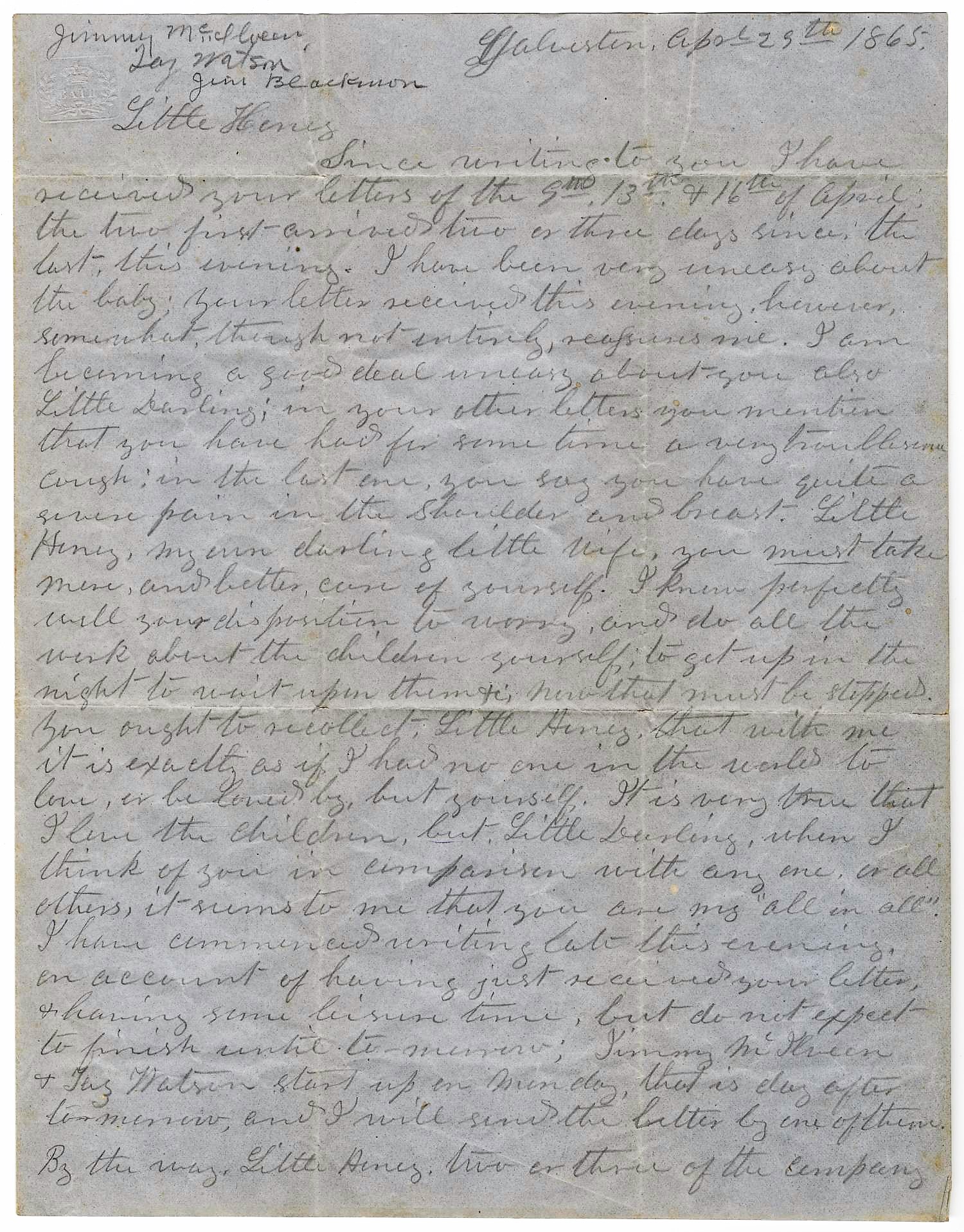
-
Description
Letter from L. D. Bradley to Minnie Bradley, dated April 29, 1865 and sent from Galveston, in which he writes about his concern for her health, mentions the death of President Lincoln and his presumptions about its effect on the war.
-
Source
Pearce Museum at Navarro College via The Portal to Texas History
-
Rights
This item is in the public domain.
-
Creator
L.D. Bradley
-
Date
April 29, 1865
-
Dimensions
[4] p. ; 27 cm
from May. 1, 1865
Letter to Mary Todd Lincoln from Queen Victoria
-
Full Title
Letter to Mary Todd Lincoln from Queen Victoria
-
Description
Manuscript transcription of a letter from Queen Victoria to Mrs. Abraham Lincoln, written in purple ink on white woven paper. Queen Victoria, the British monarch, wrote to Mary Lincoln after learning about the assassination of Abraham Lincoln. The two women had never met, but Queen Victoria wanted to convey her sympathies to Mrs. Lincoln because she also lost her husband in 1861 and went into intense mourning.
-
Transcription
Copy of a letter from Queen Victoria to Mrs. President Lincoln Osborne, April. 1865
Thought a stranger to you, cannot remain silent w[?] so terrible a calamity has fallen upon you and your country; and must personally express my deep and heartfelt sympathy wi[?] you under shocking circumstances of your present— dreadful misfortune. No one can better appreciate, than I can, who am myself utterly broken hearted by the loss of my own beloved husband, who was the light of my life, my stay, my all, —what your own sufferings must be, and I earnestly pray that you may be supported by Him, to whom alone the sorely stricken can look for comfort in their hour of heavy afflication.
With the renewed expression of true sympathy, I remain, dear Madam, Your sincere friend, Victoria -
Source
Library of Congress
-
Rights
This item is in the public domain and may be reproduced and used for any purpose, including research, teaching, private study, publication, broadcast or commercial use, with proper citation and attribution.
-
Tags
-
Cite this Item
Queen Victoria. "Letter to Mary Todd Lincoln from Queen Victoria". Remembering Lincoln. Web. Accessed August 22, 2025. https://rememberinglincoln.fords.org/node/1108
-
Creator
Queen Victoria
-
Date
1865
-
Dimensions
21 x 11 cm
from May. 1, 1865
Letter to Mary Todd Lincoln from Queen Victoria
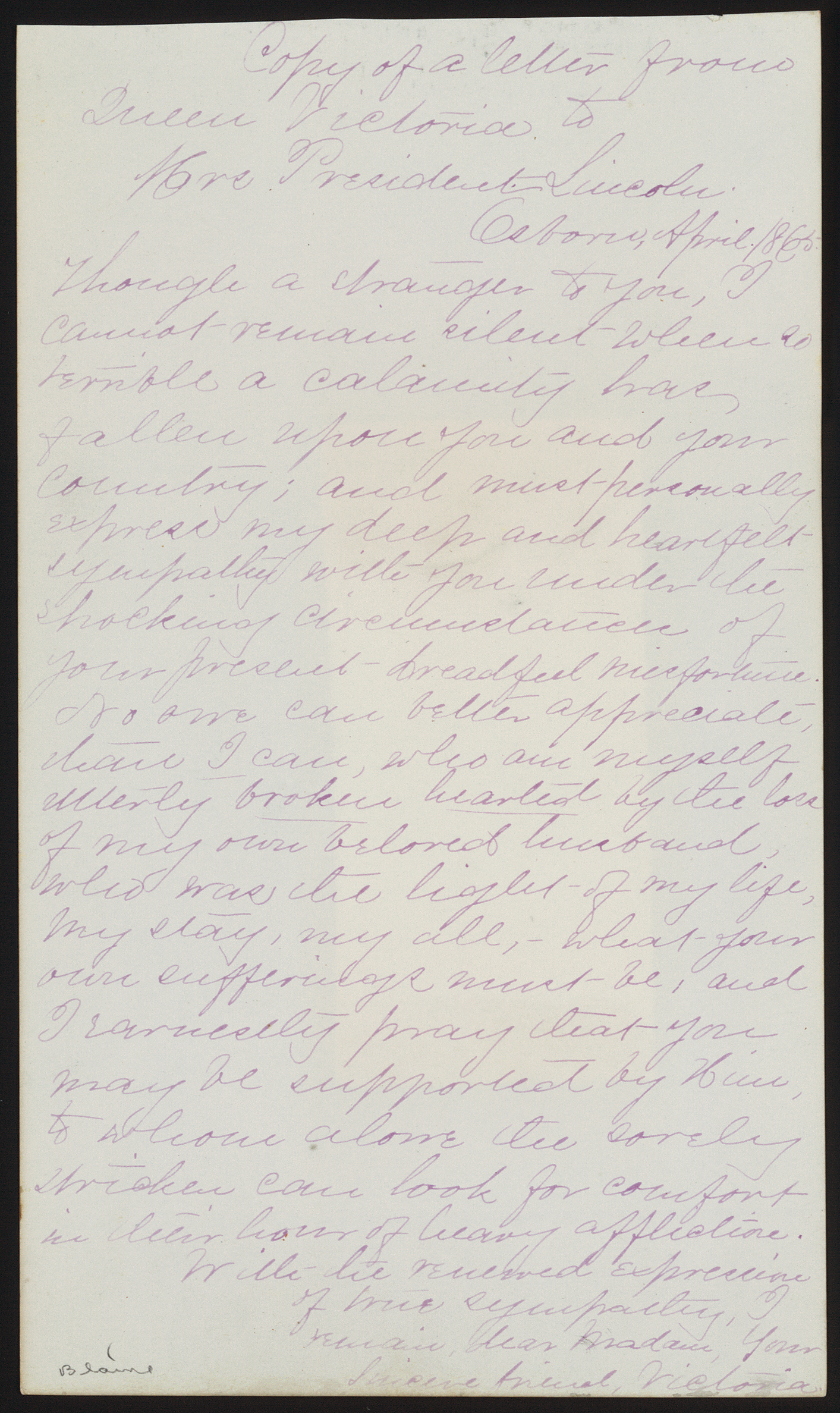
-
Description
Manuscript transcription of a letter from Queen Victoria to Mrs. Abraham Lincoln, written in purple ink on white woven paper. Queen Victoria, the British monarch, wrote to Mary Lincoln after learning about the assassination of Abraham Lincoln. The two women had never met, but Queen Victoria wanted to convey her sympathies to Mrs. Lincoln because she also lost her husband in 1861 and went into intense mourning.
-
Source
Library of Congress
-
Rights
This item is in the public domain and may be reproduced and used for any purpose, including research, teaching, private study, publication, broadcast or commercial use, with proper citation and attribution.
-
Creator
Queen Victoria
-
Date
May 1, 1865
-
Dimensions
21 x 11 cm
from Apr. 20, 1865
Letter from William H. Kesler, 3rd Missouri Cavalry
-
Full Title
Letter from William H. Kesler, 3rd Missouri Cavalry, to his sister Rose Ann Kesler
-
Description
A letter from William H. Kesler to his sister Rose Ann Kesler in late April 1865. He writes to her about hearing of the assassination, his sorrow and anger toward the assassin. At the beginning of the Civil War, William H. Kesler resided in Champaign, Illinois but joined the Missouri volunteer units after the quota was reached in his home state. He served in the 3rd Missouri Calvary from January 1862 - June 1865. He joined Company D, which was captained by John H. Reed and composed of men from both Missouri and Illinois. As part of a Union cavalry brigade, the 3rd Missouri Cavalry marched into Arkansas in August 1863, and was part of the force which captured the state capital at Little Rock on September 10th of that year. He spent much of the rest of the war in the Little Rock area and returned home in June of 1865.
-
Transcription
Little Rock Ark April 20th 1865
Dear Sister I seat my self this morn for the purpose of penning you a few lines to let you know that I am in good health and hope those few lines may find you in the same enjoyment. I received yours of the 10th a short time since and was happy to hear from you and learn that you were all in good health. I should like to have been to the Supper given by the good Templers for I know they must have had a fine Supper and a pleasant time. I think you would have been fixed if I had been home the day you had so many visiters but I expect that I would have spoiled the enjoyment of the rest of the party with my (gass). I am glad to hear that you will not open my package of letters that I sent home by Mrs Reed. But tell Mother not to be to sure a bout them being from the girls. And that I will read a few of them to her when I come home. But can not promise to read them all as it would take up to much time and then would not be interesting to her. The joy of the troops here was turned in to sorrow on receiving the news of the assassination of the President. I felt that day a though I could shoot any body that was a rebel. Oh how I should love to have the fun of putting the man to death that Killed the President. My feelings were such that I could have cut him up in inch peaces. But never mind the soldiers of the North will avenge his death with a thousand lives. I want to see this war closed now. For the feelings of the Soldiers now toward the south is not very friendly sure. I Expressed $100.00 One Hundred Dollars home a few days a go by parkers Express. I have nothing of importance to write so I will close hoping to hear from you soon. I remain as ever your Affectionate Brother Will
P.S. please Write soon And excuse mistakes Will
I am going to send you a painting of the hospital at Little Rock. Which I want you to Keep clean and nice untill I come home. Will -
Source
The State Historical Society of Missouri
-
Rights
This item is in the public domain and may be reproduced and used for any purpose, including research, teaching, private study, publication, broadcast or commercial use, with proper citation and attribution.
-
Tags
-
Cite this Item
William H. Kesler. "Letter from William H. Kesler, 3rd Missouri Cavalry, to his sister Rose Ann Kesler". The State Historical Society of Missouri. Remembering Lincoln. Web. Accessed August 22, 2025. https://rememberinglincoln.fords.org/node/1094
-
Creator
William H. Kesler
-
Publisher
The State Historical Society of Missouri
-
Date
April 20, 1865
from Apr. 20, 1865
Letter from William H. Kesler, 3rd Missouri Cavalry, to his sister Rose Ann Kesler
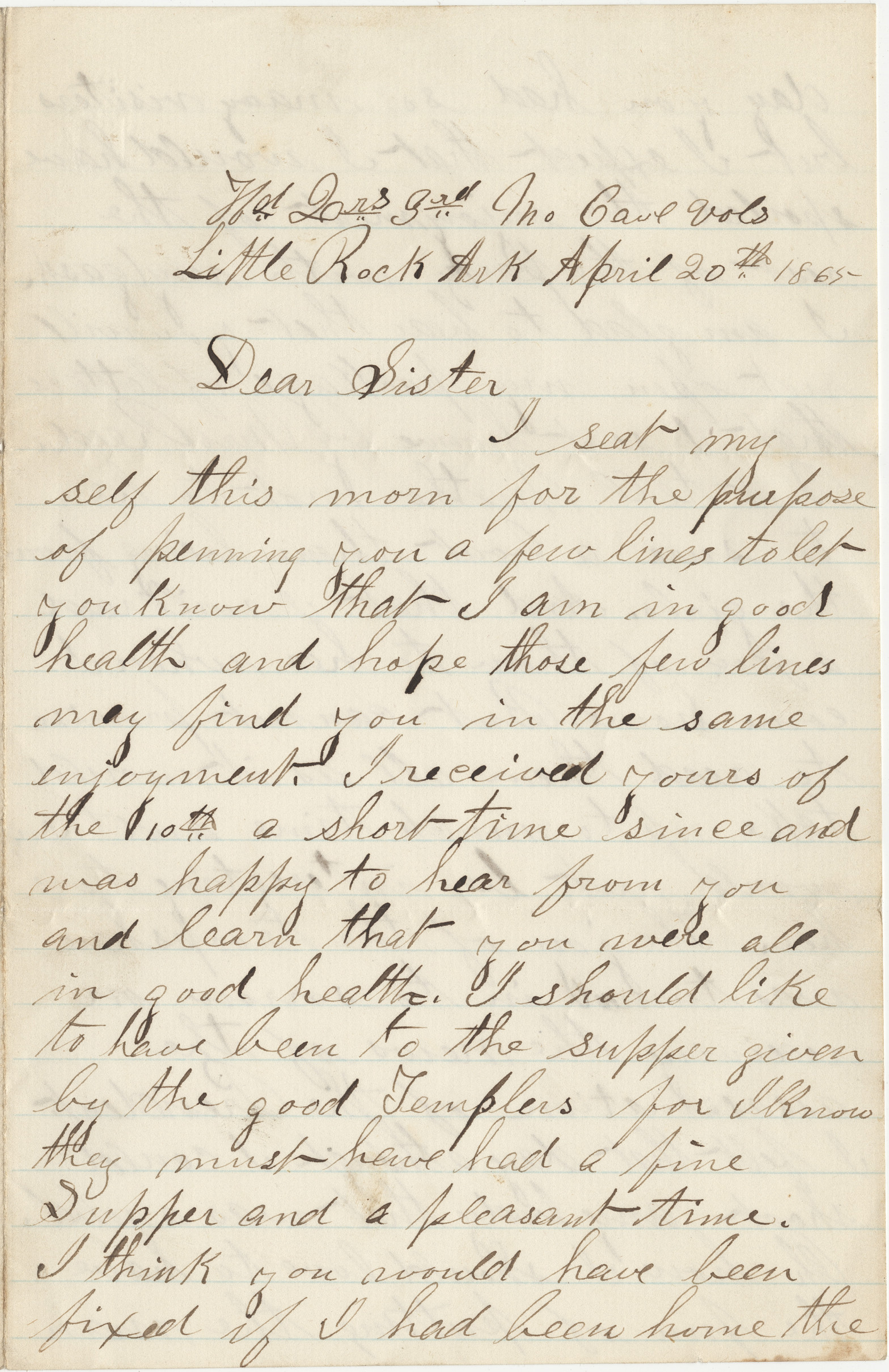
-
Description
A letter from William H. Kesler to his sister Rose Ann Kesler in late April 1865. He writes to her about hearing of the assassination, his sorrow and anger toward the assassin. At the beginning of the Civil War, William H. Kesler resided in Champaign, Illinois but joined the Missouri volunteer units after the quota was reached in his home state. He served in the 3rd Missouri Calvary from January 1862 - June 1865. He joined Company D, which was captained by John H. Reed and composed of men from both Missouri and Illinois. As part of a Union cavalry brigade, the 3rd Missouri Cavalry marched into Arkansas in August 1863, and was part of the force which captured the state capital at Little Rock on September 10th of that year. He spent much of the rest of the war in the Little Rock area and returned home in June of 1865.
-
Source
The State Historical Society of Missouri
-
Rights
This item is in the public domain and may be reproduced and used for any purpose, including research, teaching, private study, publication, broadcast or commercial use, with proper citation and attribution.
-
Creator
William H. Kesler
-
Publisher
The State Historical Society of Missouri
-
Date
April 20, 1865
from Jan. 31, 1866
Joseph S. Caulk to Andrew Johnson and Edwin M. Stanton
-
Full Title
Joseph S. Caulk to Andrew Johnson and Edwin M. Stanton
-
Description
Joseph S. Caulk, a veteran of Company K of the 24th Regiment of the U.S. Colored Infantry, wrote to President Andrew Johnson and Secretary of War Edwin Stanton seeking permission to march while armed to honor the deceased President Abraham Lincoln's birthday in 1866. Caulk, a bricklayer from Delaware, enlisted in the U.S. Army at age 44 on March 28, 1865, shortly before the surrender of Confederate General Robert E. Lee.
-
Transcription
Wilmington Jan 31th 1866
Sir
Mr President or Secatary of Ware by Permishin i take the liberty to ask you to be so kind as to gave us the Returnd Soldears of the State of Delawear a permit to turn under armes on the 12th of Februeary to Silabrat of our Well belovid Mr Aberham Lincoln birth day our opposers has Sead the collard pepel Wor going to rase but person With comon Sence Wold know better yours With respect Write to
Joseph S. Caulk W. 7. St No 214
Wilmington, Del– -
Source
Shared by Jonathan White, associate professor of American Studies at Christopher Newport University. Joseph S. Caulk to Andrew Johnson and Edwin M. Stanton, January 31, 1866, in RG 107 (Records of the Office of the Secretary of War), microfilm M494 (Letters Received by the Secretary of War From the President, Executive Departments, and War Department Bureaus, 1862-1870), reel 84.
-
Rights
This item is in the public domain may be reproduced and used for any purpose, including research, teaching, private study, publication, broadcast or commercial use, with proper citation and attribution.
-
Tags
-
Cite this Item
Joseph S. Caulk. "Joseph S. Caulk to Andrew Johnson and Edwin M. Stanton". Remembering Lincoln. Web. Accessed August 22, 2025. https://rememberinglincoln.fords.org/node/1087
-
Creator
Joseph S. Caulk
-
Date
January 31, 1866
from Jan. 31, 1866
Joseph S. Caulk to Andrew Johnson and Edwin M. Stanton
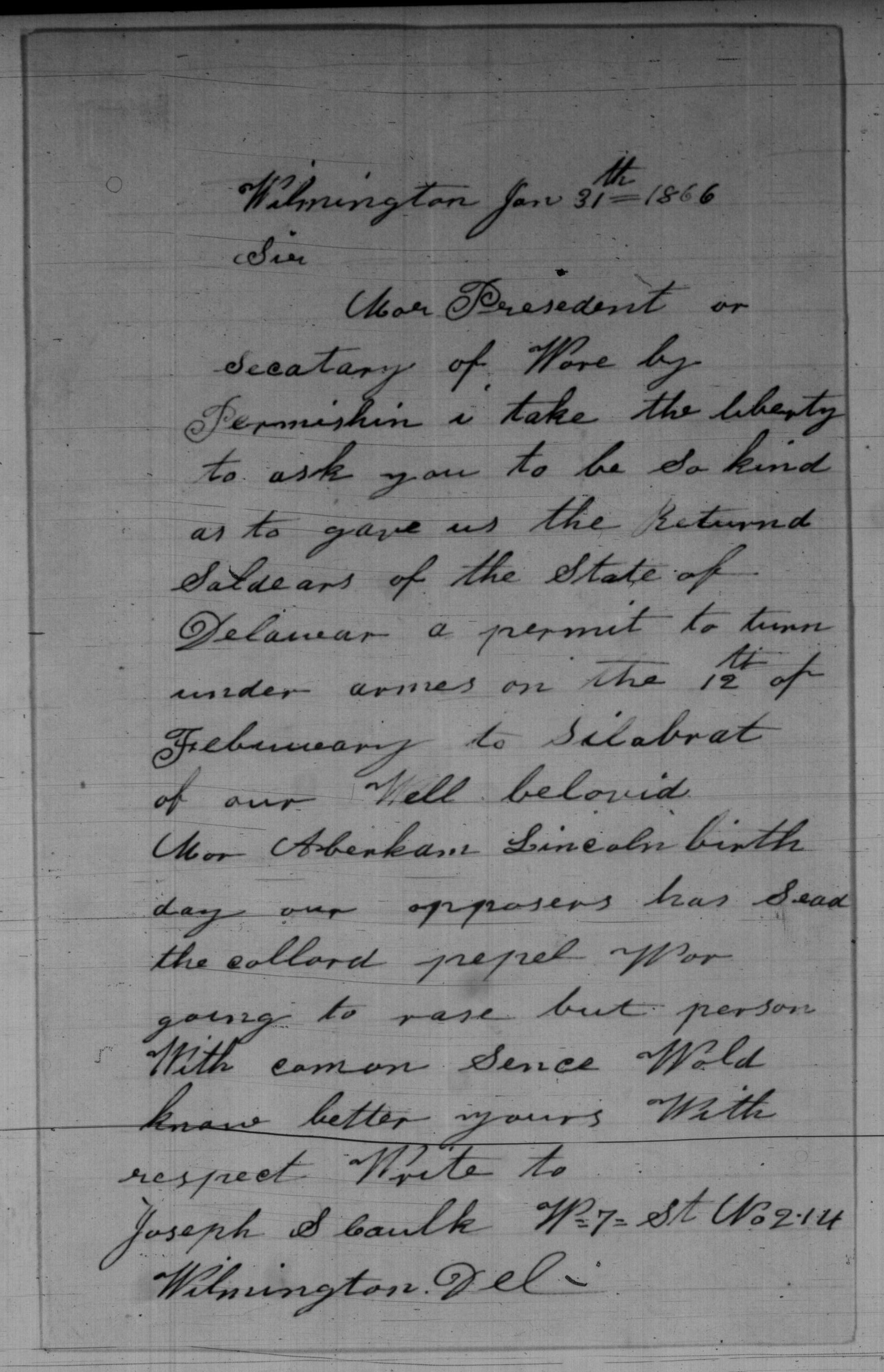
-
Description
Joseph S. Caulk, a veteran of Company K of the 24th Regiment of the U.S. Colored Infantry, wrote to President Andrew Johnson and Secretary of War Edwin Stanton seeking permission to march while armed to honor the deceased President Abraham Lincoln's birthday in 1866. Caulk, a bricklayer from Delaware, enlisted in the U.S. Army at age 44 on March 28, 1865, shortly before the surrender of Confederate General Robert E. Lee.
-
Source
Shared by Jonathan White, associate professor of American Studies at Christopher Newport University. Joseph S. Caulk to Andrew Johnson and Edwin M. Stanton, January 31, 1866, in RG 107 (Records of the Office of the Secretary of War), microfilm M494 (Letters Received by the Secretary of War From the President, Executive Departments, and War Department Bureaus, 1862-1870), reel 84.
-
Rights
This item is in the public domain may be reproduced and used for any purpose, including research, teaching, private study, publication, broadcast or commercial use, with proper citation and attribution.
-
Creator
Joseph S. Caulk
-
Date
January 31, 1866
from Apr. 15, 1865
Letter to Mother
-
Full Title
Letter from John T. Ford to his Mother
-
Description
John T. Ford, owner of Ford's Theatre, wrote a letter to his mother, in Richmond, Va., the day of President Abraham Lincoln's death, apparently unaware of the news that the president had been murdered in his theatre. Ford expresses gratitude for his wife's health and the growth of his children. Coincidentally, he states that his daughter's birthday is April 15, and that his birthday is April 16. After hearing of the assassination, Ford took a train to Baltimore and was then arrested, questioned about the attack and imprisoned for a month. Ford denied any involvement in the conspiracy despite the fact that he had been a friend of John Wilkes Booth. Ownership of the theatre returned to Ford after the investigation and he attempted to reopen for performances. Many threatened to burn the theatre down and Ford eventually sold the building to the federal government. He continued to own and operate theatres in Maryland, Pennsylvania, South Carolina and Virginia.
-
Transcription
Dear Mother
I came to Richmond
hoping to see you and Frances - I
was glad to learn that she had
gone to Baltimore - I go home
Monday morning
I left all well, Edith has been in
bad health for nearly one year
but she is now quite well.
We have our six children, Annie
is taller than her mother - Charlie
is a very bright handsome boy nearly
13 years old. He is studying hard
and a fine scholar. George is
my [?] he is next to Charlie and
a dear good boy. Lizzie and Fannie
are two of the prettiest and sweetest
little girls in Baltimore.
John Lee is the youngest. He
is Martha's boy. He [masters?] her
everyway, and she has spoiled
him completely. She says Johnnie
is the prettiest
Martha is well and happy only
like Edith anxious about
you. They send their love
to all. Lucy-Jane, [?]
their brother and all
I Send you twenty dollars for
yourself and twenty dollars for
Jane as I fear she wants it. Send
it to her
Mrs. Stark has kindly promised to
send this. When I write again
I will direct to her care
Let me hear from you soon direct
to the enclosed direction - use
the envelope withing this letter and
have it put in the Richmond Postoffice
with the love of all, I am
affectionately yours
J. T. Ford
Richmond Va April 15th 1865
Today is Saturday Annie's birthday fifteen
years old. Tomorrow I am 36. -
Source
Box 4, John Thompson Ford Papers, Manuscript Division, Library of Congress, Washington, D.C.
-
Rights
This item is in the public domain and may be reproduced and used for any purpose, including research, teaching, private study, publication, broadcast or commercial use, with proper citation and attribution.
-
Tags
-
Cite this Item
John T. Ford. "Letter from John T. Ford to his Mother". Remembering Lincoln. Web. Accessed August 22, 2025. https://rememberinglincoln.fords.org/node/1078
-
Creator
John T. Ford
-
Date
April 15, 1865
from Apr. 15, 1865
Letter from John T. Ford to his Mother
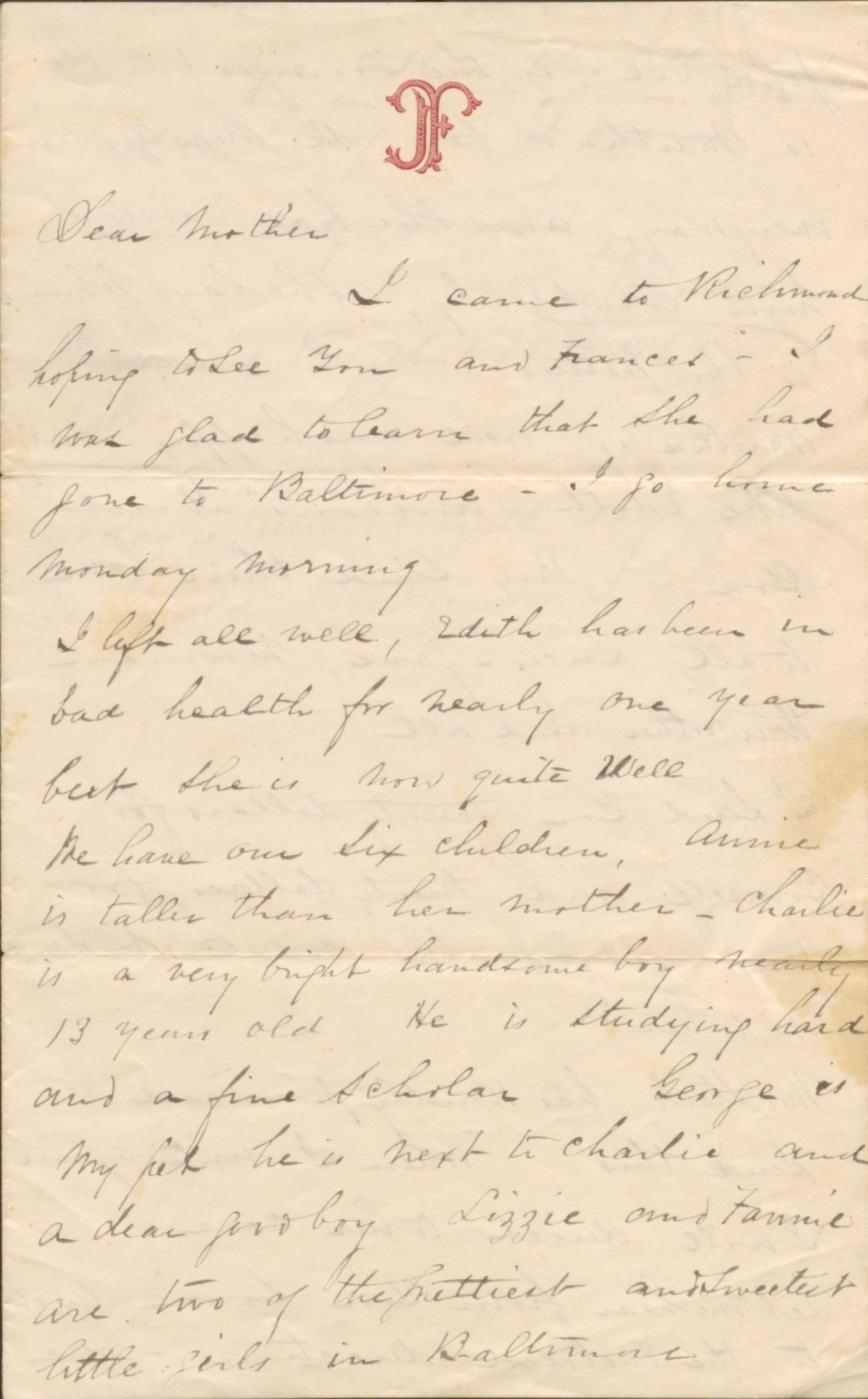
-
Description
John T. Ford, owner of Ford's Theatre, wrote a letter to his mother, in Richmond, Va., the day of President Abraham Lincoln's death, apparently unaware of the news that the president had been murdered in his theatre. Ford expresses gratitude for his wife's health and the growth of his children. Coincidentally, he states that his daughter's birthday is April 15, and that his birthday is April 16. After hearing of the assassination, Ford took a train to Baltimore and was then arrested, questioned about the attack and imprisoned for a month. Ford denied any involvement in the conspiracy despite the fact that he had been a friend of John Wilkes Booth. Ownership of the theatre returned to Ford after the investigation and he attempted to reopen for performances. Many threatened to burn the theatre down and Ford eventually sold the building to the federal government. He continued to own and operate theatres in Maryland, Pennsylvania, South Carolina and Virginia.
-
Source
Box 4, John Thompson Ford Papers, Manuscript Division, Library of Congress, Washington, D.C.
-
Rights
This item is in the public domain and may be reproduced and used for any purpose, including research, teaching, private study, publication, broadcast or commercial use, with proper citation and attribution.
-
Creator
John T. Ford
-
Date
April 15, 1865
from Apr. 22, 1865
P.W. Oakley to Norman Henry Ives
-
Full Title
P.W. Oakley to Norman Henry Ives
-
Description
P.W. Oakley of St. Louis, Missouri, wrote this letter to Norman Henry Ives in Nashville, Tennessee, on April 22, 1865, a week after John Wilkes Booth assassinated President Abraham Lincoln. Oakley and Ives shared the bond of having been injured during the Civil War--Ives, a native of Illinois, had been discharged from the U.S. Army after suffering a leg wound at the Battle of Pea Ridge in 1862. Oakley begins the letter by discussing his injury. He then turns to his thoughts about the assassination of Lincoln, referring to the slain president as "Uncle Abe." Oakley suggests that Lincoln would have shown more lenience to Confederates than his successor, Andrew Johnson, would (speculation that would prove untrue). He also expresses hope that Confederate leadership would "pull hemp"--be hanged--for the assassination. Oakley then goes on to brag about the size of his 10-month-old son. Ives kept this letter and eventually passed it down through his family. His great-great-granddaughter Arlis Groves, a social science teacher at Toby Johnson Middle School in Elk Grove, California, now holds this letter and contributed it to Remembering Lincoln.
-
Transcription
April 22, 1865
St. Louis Mo
Friend Ives
Dear Sir,
I just got your note of Apr. 10th. I was glad to receive a line from my brother soldier. It has been a long time since I had a line from you. I am glad that you have got around once more. I can get around very well, but my limb discharges yet. It is very sore. I am haveing a peace of bone coming out, & I hope when it gets out that it will close up. We aught to be thankful to god that we came out as well as we did, many a poor man has lost his life since this war began. What a loss we have met with. (Aughful to think of, when we think of Uncle Abe. & to think that it was a Reb. that took his life. The Rebs. have lost a good friend in the death of our Chief Magistrate, for he has gave the Rebs more lenity than Andy Johnson will. I say when they struck at the heart of Mr. Lincoln they struck at the heart of all loyal men in America, & I hope to god that Andy Johnson will make the head men of the south pull hemp. You are aware how I once felt in regard to this war. But, I say today, kill the last traitor to his country. By the way, Ives, I have got the bigist son of his age in the west. 10 months old and his weight is 40 lbs. Have you seen a biger one than that? If so, let me know it. My wife is well. And so is my son. Ives, some day you will get your money that I owe you. I shant forget your kindness nor nether shall I forget that I ow you. I would like to see you & if you should come to St Louis, come and see me. Say what you are at in your next.
Yours &c,
P.W. Oakley -
Source
Arlis Groves, great-great-granddaughter of Norman Henry Ives
-
Rights
This item is in the public domain and may be reproduced and used for any purpose, including research, teaching , private study, publication, broadcast or commercial use, with proper citation and attribution.
-
Tags
-
Cite this Item
P.W. Oakley. "P.W. Oakley to Norman Henry Ives". Remembering Lincoln. Web. Accessed August 22, 2025. https://rememberinglincoln.fords.org/node/1016
-
Creator
P.W. Oakley
-
Date
April 22, 1865
from Apr. 22, 1865
P.W. Oakley to Norman Henry Ives
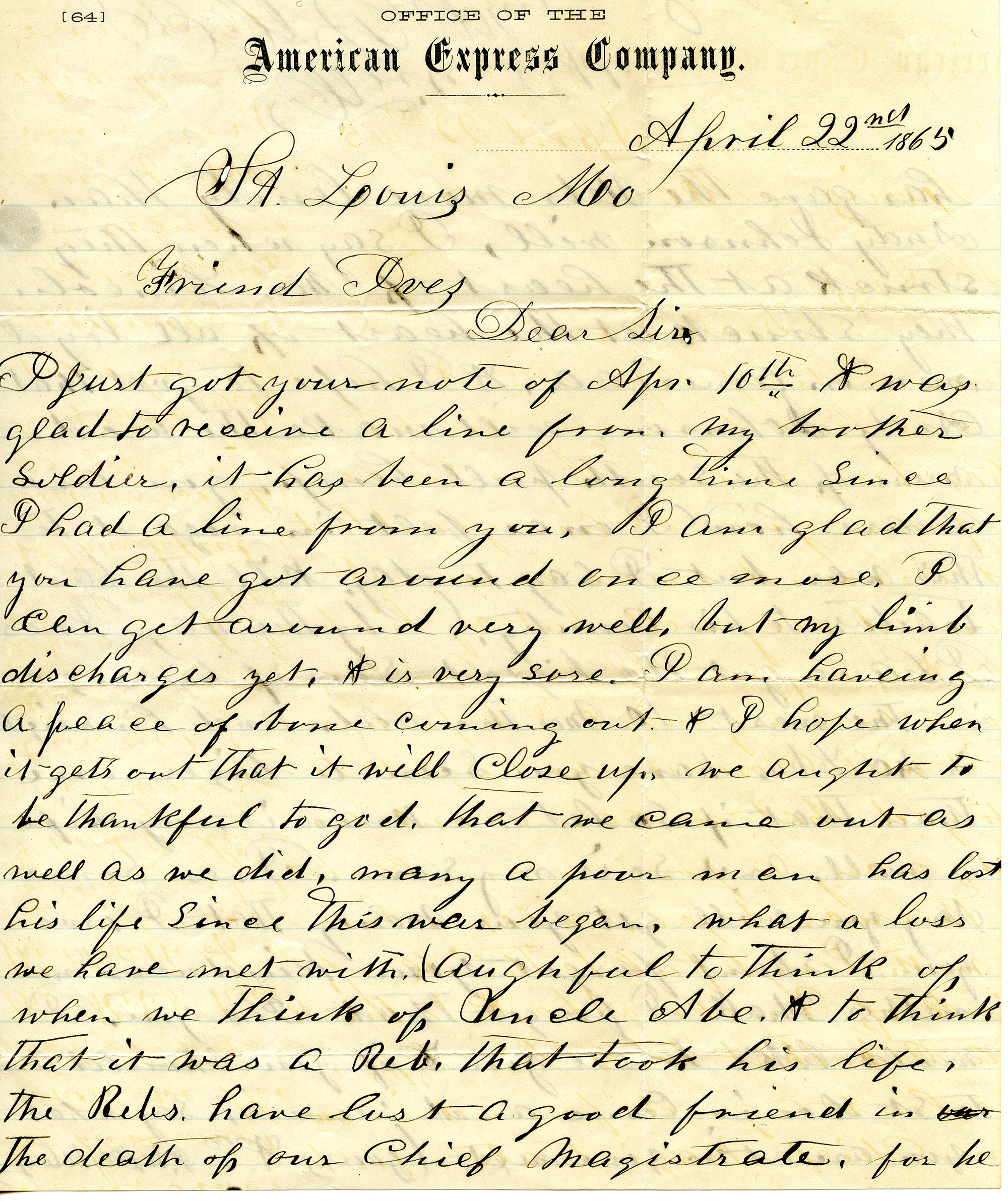
-
Description
P.W. Oakley of St. Louis, Missouri, wrote this letter to Norman Henry Ives in Nashville, Tennessee, on April 22, 1865, a week after John Wilkes Booth assassinated President Abraham Lincoln. Oakley and Ives shared the bond of having been injured during the Civil War--Ives, a native of Illinois, had been discharged from the U.S. Army after suffering a leg wound at the Battle of Pea Ridge in 1862. Oakley begins the letter by discussing his injury. He then turns to his thoughts about the assassination of Lincoln, referring to the slain president as "Uncle Abe." Oakley suggests that Lincoln would have shown more lenience to Confederates than his successor, Andrew Johnson, would (speculation that would prove untrue). He also expresses hope that Confederate leadership would "pull hemp"--be hanged--for the assassination. Oakley then goes on to brag about the size of his 10-month-old son. Ives kept this letter and eventually passed it down through his family. His great-great-granddaughter Arlis Groves, a social science teacher at Toby Johnson Middle School in Elk Grove, California, now holds this letter and contributed it to Remembering Lincoln.
-
Source
Arlis Groves, great-great-granddaughter of Norman Henry Ives
-
Rights
This item is in the public domain and may be reproduced and used for any purpose, including research, teaching , private study, publication, broadcast or commercial use, with proper citation and attribution.
-
Creator
P.W. Oakley
-
Date
April 22, 1865
from Apr. 21, 1865
Union League Funeral Invitation
-
Full Title
Union League of Philadelphia Funeral Invitation Letter
-
Description
Secretary of The Union League of Philadelphia, George H. Boker, wrote to League members about their role in receiving President Lincoln's body during the funeral procession through Philadelphia.
-
Transcription
UNION LEAGUE HOUSE,
Philadelphia, April 21, 1865.
SIR:
The Committee of the Select and the Common Councils of Philadelphia, having conferred upon the “UNION LEAGUE” the honor of receiving the body of the late President of the United States on its arrival in Independence Square, you are requested to meet your fellow-members at Concert Hall, at an hour to be hereafter announced, for the purpose of assisting at that ceremony.
It is the earnest desire of the Board that every member of the League, wearing his badge, shall be present on this occasion.
George H. Boker,
Secretary.
[Transcription by: Ricarda H., Dr. Susan Corbesero’s Class, Ellis School, Pittsburgh, Pennsylvania] -
Source
The Abraham Lincoln Foundation of The Union League of Philadelphia (Object ID: XI.2.003)
-
Rights
Use of this item for research, teaching and private study is permitted with proper citation and attribution, as “Courtesy of The Abraham Lincoln Foundation of The Union League of Philadelphia.” Reproduction of this item for publication, broadcast or commercial use requires written permission. For permission, please contact The Abraham Lincoln Foundation.
-
Tags
-
Cite this Item
George H. Boker. "Union League of Philadelphia Funeral Invitation Letter". Union League of Philadelphia. Remembering Lincoln. Web. Accessed August 22, 2025. https://rememberinglincoln.fords.org/node/1006
from Apr. 21, 1865
Union League of Philadelphia Funeral Invitation Letter
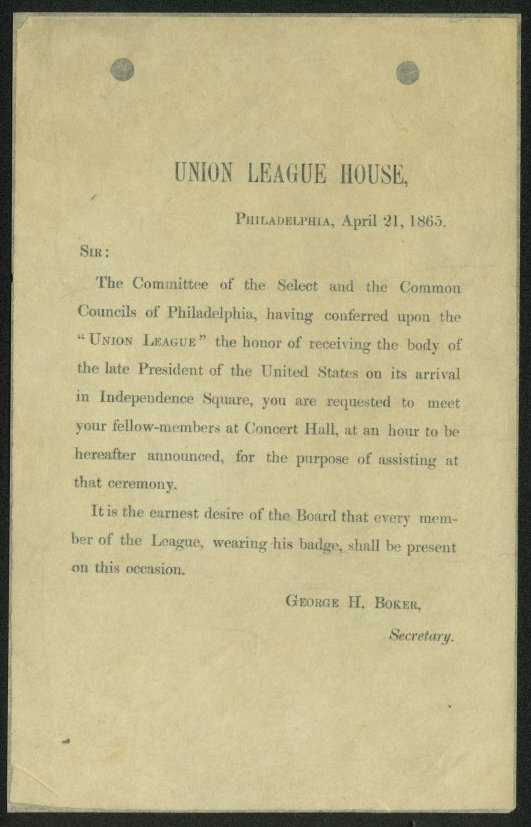
-
Description
Secretary of The Union League of Philadelphia, George H. Boker, wrote to League members about their role in receiving President Lincoln's body during the funeral procession through Philadelphia.
-
Source
The Abraham Lincoln Foundation of The Union League of Philadelphia (Object ID: XI.2.003)
-
Rights
Use of this item for research, teaching and private study is permitted with proper citation and attribution, as “Courtesy of The Abraham Lincoln Foundation of The Union League of Philadelphia.” Reproduction of this item for publication, broadcast or commercial use requires written permission. For permission, please contact The Abraham Lincoln Foundation.
-
Creator
George H. Boker
-
Publisher
Union League of Philadelphia
-
Date
April 21, 1865
-
Material
ink on paper

